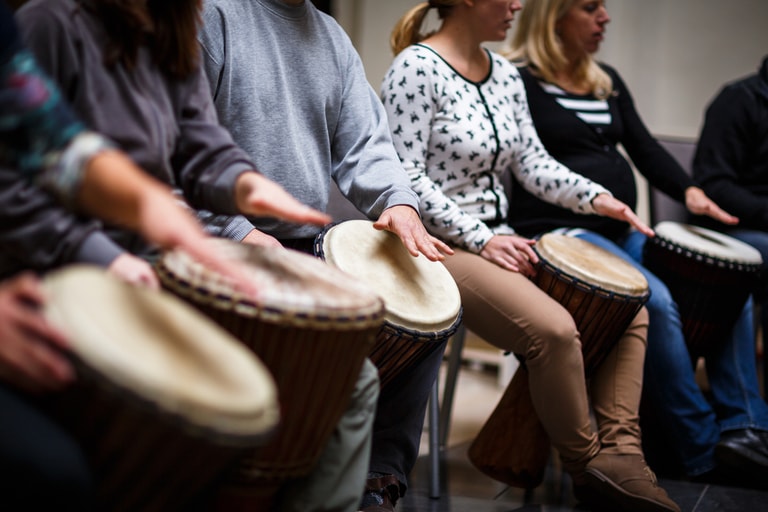By Alexandria Weaver, University of California, Irvine
Imagine listening to your favorite song, how it makes you feel, and the flood of memories the sounds bring with them. Music is well known for its ability to evoke emotions and memories and has an array of uses, including therapy for rehabilitation and as a tool for teaching, learning, expression, celebration, bonding, and so much more.
Music as a tool seems great, but how much can it really do? In recent years, scientists have been interested in music’s potential to change our cognitive abilities. Unfortunately, listening to Mozart sonatas will not make you smarter, but listening to music does have the ability to change your mood, which might slightly affect how you perform on a test from one day to another.
Playing music also seems to affect how certain regions of our brains look. Research tells us that musicians’ brains are structurally different in areas that are related to motor, auditory, and visual-spatial regions due to years of practice, and musicians have also been found to perform higher on tests of executive functioning compared to non-musicians.
What is Executive Function?
Our executive functions work together to help us pay attention while inhibiting distractions, hold and organize information, switch between different points of view, problem solve, and regulate our emotions. There are three main parts to executive functions: working memory, cognitive flexibility, and inhibitory control. These processes help us navigate the world we live in and are essential to efficiently processing information.
Playing a musical instrument is believed to develop executive function because performance and intense practice puts a high demand on those cognitive areas and strengthens them.
Many music research studies have used a cross-sectional design to determine if musical training is correlated with differences in cognitive functioning. This makes it difficult to conclude for sure that playing an instrument develops areas of executive functioning or if there are preexisting differences in executive functioning that make individuals more likely to play an instrument. As a result, there has been a mix of findings and debate about whether or not music training substantially causes differences in cognitive functioning.

An ideal way to test whether there are benefits to musical training is to randomly assign non-musician participants to different groups where some participants learn an instrument for a long period of time, and some don’t. This allows for comparisons on performance between and within groups on tests of executive functioning before training and every few years while training. An example of this kind of longitudinal study is currently being conducted by Dr. Assal Habibi and her colleagues in Los Angeles, California. They created a youth orchestra modeled after El Sistema, a similar program taking place in Venezuela. In Dr. Habibi and colleagues’ study, they compared children participating in the youth orchestra to children participating in sports, as well as to children who were not involved in any intense after school program. After participating in music, sports, or no intense after school program for two years, they found that children in the music group showed much better performance in auditory skills and observed brain related changes in auditory regions compared with children participating in sports or no intense after school program. They also observed stronger neural activation during a task measuring executive function compared with children without music or sports training. Even though they didn’t find major differences between the music and sports group beyond auditory areas in the brain, this study provides evidence that those differences in auditory regions are more than likely due to musical training rather than any pre-existing differences. This is an ongoing study, so stay tuned for their report of their findings after four years of training.
Does Musical Training Improve School Performance?
Long answer short, research generally says yes. While many studies have found a positive relationship between music lessons and academic performance, the exact reason for this is still debated. Some research attributes improved academic performance to improvements in executive function skills as a result of music training.
Other research on music and academic achievement highlight the importance that musical engagement plays in increasing self-esteem, motivation, and ability to deal with stress. At times, learning can be frustrating and difficult. If providing students the opportunity to play an instrument or participate in a musical group such as choir can positively impact their self-esteem, motivation, and ability to deal with stress, this might support students in their academic learning in general.
It’s Not All About the Instruments
Not everyone has access to an instrument or the time to intensely train for long hours every day, so what else can we do? Dr. Vesa Putkinen and colleagues conducted a correlational study with children examining the relation between informal engagement with music at home such as singing, and auditory abilities such as attention and discrimination. They found that the more children were involved with musical activities at home, the less likely they were to get distracted by novel sounds during the experiment. Based on their findings, Dr. Putkinen and colleagues suggest that engaging in these kinds of informal music activities in early childhood might be beneficial to the development of important auditory functions. Classrooms can sometimes be full of distractions, especially when there is a lot of noise. Having the ability to inhibit these kinds of auditory distractors at an early age may help students better focus on verbal instructions during class, which can have an impact on their school performance.

Dr. Sylvain Moreno and colleagues did a study not utilizing instruments, but instead an interactive computerized training program designed for preschool children. Students took part in either a music curriculum which was composed of mainly listening activities, or a visual arts curriculum emphasizing visuospatial skills. They found that students in the music group showed improved performance on verbal ability and executive functioning compared with students in the visual arts group. Verbal ability and executive functions have both been shown to be important to academic achievement.
Even though researchers have not come to a consensus on why music improves students’ performance, no research has found musical engagement to be significantly harmful. So, keep singing and practicing your instrument of choice and when your neighbors say to keep the noise down, let them know you’re exercising your executive functions, increasing your self-esteem, and ask them to join you by singing along.
Is that All?
Of course not! Music can help us develop other skills important for our cognitive development. Participating in musical groups such as a choir, orchestra, or band can create friendships, helps children develop social skills, and can lead to a sense of belonging. Working in groups involves teamwork, cooperation, and learning to recognize the emotions and reactions of others while appropriately responding to them. Engaging with music has also been associated with improved self-regulation and an increase in emotional awareness.
Concert venues are constantly overflowing with dedicated fans that come together and bond over their shared interest in a particular artist or genre of music, and for many cultures, music is a central part of social gatherings. Overall, music has the power to bring people together in many different ways, and is beneficial to our overall cognitive development.
Who knows what we will discover 10 years from now? Researchers have only scratched the surface of music and how it affects human cognition.
Alexandria Weaver is currently pursuing her PhD in Education at the University of California, Irvine. In the Working Memory and Plasticity Lab, she is investigating the effects of cognitive training – such as playing a musical instrument – on working memory and how acquired skills and knowledge transfer across cognitive domains.
References
Dingle, G. A., Hodges, J., & Kunde, A. (2016). Tuned In Emotion Regulation Program Using Music Listening: Effectiveness for Adolescents in Educational Settings. Frontiers in psychology, 7, 859.
Gaser, C., & Schlaug, G. (2003). Brain Structures Differ between Musicians and Non-Musicians. The Journal of Neuroscience, 23(27), 9240–9245.
Habibi, A., Damasio, A., Ilari, B., Elliott Sachs, M., & Damasio, H. (2018). Music training and child development: a review of recent findings from a longitudinal study: Music training and child development: a review. Annals of the New York Academy of Sciences, 1423(1), 73–81.
Hallam, S. (2010). The power of music: Its impact on the intellectual, social and personal development of children and young people. International Journal of Music Education, 28(3), 269–289.
Kokotsaki, D., & Hallam, S. (2011). The perceived benefits of participative music making for non-music university students: a comparison with music students. Music Education Research, 13(2), 149–172.
Moreno, S., Bialystok, E., Barac, R., Schellenberg, E. G., Cepeda, N. J., & Chau, T. (2011). Short-Term Music Training Enhances Verbal Intelligence and Executive Function. Psychological Science, 22(11), 1425–1433.
Pietschnig, J., Voracek, M., & Formann, A. K. (2010). Mozart effect–Shmozart effect: A meta-analysis. Intelligence, 38(3), 314–323.
Putkinen, V., Tervaniemi, M., & Huotilainen, M. (2013). Informal musical activities are linked to auditory discrimination and attention in 2-3-year-old children: an event-related potential study. European Journal of Neuroscience, 37(4), 654–661.
Wetter, O. E., Koerner, F., & Schwaninger, A. (2009). Does musical training improve school performance? Instructional Science, 37(4), 365–374.
Winsler, A., Ducenne, L., & Koury, A. (2011). Singing One’s Way to Self-Regulation: The Role of Early Music and Movement Curricula and Private Speech. Early Education & Development, 22(2), 274–304.
Note: The views expressed in this article are the author/s, and not the position of Intellectual Dose, or iDose (its online publication). This article is republished from Knowing Neurons under a Creative Commons license.



